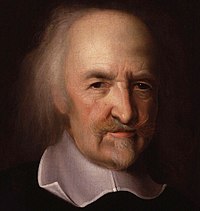Thomas Hobbes
Thomas Hobbes (5 April 1588 – 4 December 1679), ninu awon iwe ijoun miran bi Thomas Hobbs ara Malmsbury,[1] je ara Ilegeesi to je onimo oye, ti a mo loni fun ise re lori imo-oye oloselu. Iwe re odun 1651 Leviathan sedasile ipilese fun opo imo-oye oloselu Iwoorun lati egbe ero majemu awujo.[2]
| Thomas Hobbes | |
|---|---|
 | |
| Orúkọ | Thomas Hobbes |
| Ìbí | 5 Oṣù Kẹrin 1588 Malmesbury, Wiltshire, England |
| Aláìsí | 4 Oṣù Kejìlá 1679 (ọmọ ọdún 91) Derbyshire, England |
| Ìgbà | 17th-century philosophy (Modern Philosophy) |
| Agbègbè | Western Philosophers |
| Ẹ̀ka-ẹ̀kọ́ | Social contract, classical realism, materialism |
| Ìjẹlógún gangan | Political philosophy, history, ethics, geometry |
| Àròwá pàtàkì | modern founder of the social contract tradition; life in the state of nature is "solitary, poor, nasty, brutish and short" |
Ipa látọ̀dọ̀
Plato, Aristotle, Thucydides, Tacitus, Galileo, Niccolò Machiavelli, René Descartes, Grotius, Selden, Great Tew circle
| |
Ìpa lórí
| |
| Ìtọwọ́bọ̀wé | |

|
Àyọkà yìí tàbí apá rẹ̀ únfẹ́ àtúnṣe sí. Ẹ le fẹ̀ jù báyìí lọ tàbí kí ẹ ṣàtúnṣe rẹ̀ lọ́nà tí yíò mu kúnrẹ́rẹ́. Ẹ ran Wikipedia lọ́wọ́ láti fẹ̀ẹ́ jù báyìí lọ. |
Itokasi
àtúnṣe- ↑ book title Tracts of Mr. Thomas Hobbs of Malmsbury : Containing I. Behemoth, the history of the causes of the civil wars of England, from 1640. to 1660. printed from the author's own copy: never printed (but with a thousand faults) before. II. An answer to Arch-bishop Bramhall's book, called the Catching of the Leviathan: never printed before. III. An historical narration of heresie, and the punishment thereof: corrected by the true copy. IV. Philosophical problems, dedicated to the King in 1662. but never printed before, publ. 1682
- ↑ "Hobbes's Moral and Political Philosophy". Stanford Encyclopedia of Philosophy. http://plato.stanford.edu/entries/hobbes-moral/. . Retrieved March 11, 2009.